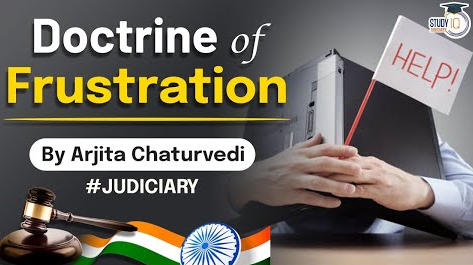Table of Contents
The doctrine of Frustration- Section 56 Indian Contract Act
- As general rule parties to contract are having an intention towards the fulfillment of their part and in case of breach, party breaching is liable to compensate for the same.
- But an exception to this rule is laid down in Section 56 of the Indian contract act 1872.
- Section 56 is based on the maxim “ les non cogit ad impossibilia” which means that the law will not compel a man to do what he cannot possibly perform.
Initial impossibility
- The term “initial impossibility” refers to situations in which the contract was impossible to fulfil from the start. As per first paragraph of Section 56 the impossibility must be pre-existing in fact or in law.
Subsequent impossibility
- It is also known as supervening impossibility. The second paragraph of Section 56 mentions the effects of the subsequent impossibilities on the contract’s performance. When a contract is made between the parties, it is often very possible to carry it out. However, something comes afterwards that makes it difficult or illegal to carry out the task. In this case, the contract is considered void.
- Paradine V. Jane
- Taylor vs Caldwell
Destruction of subject matter:
The doctrine applies where the actual and specific subject-matter of the contract has ceased to exist. Taylor vs Cadwell best illustrates this point. For example, in V.L. Narasu v. P.S.V. Iyer, a contract for screening a movie in a cinema hall became impossible to perform because the rear wall of the hall collapsed due to heavy rainfall
Supervening illegality:
If the legislature passes law after the contract is constructed to deal with the changed situation, which makes the contract frustrated
Death or Incapacity of Party:
- When there is a contract that depends on the particular skill or specific act of the promisor, his death or incapacity terminates the contract. For example in Robinson v. Davison.
- Major Indian Case related to this doctrine
- Satyabrata Ghose v Mugneeram Bangur and Company & Anr.:






















 WhatsApp
WhatsApp